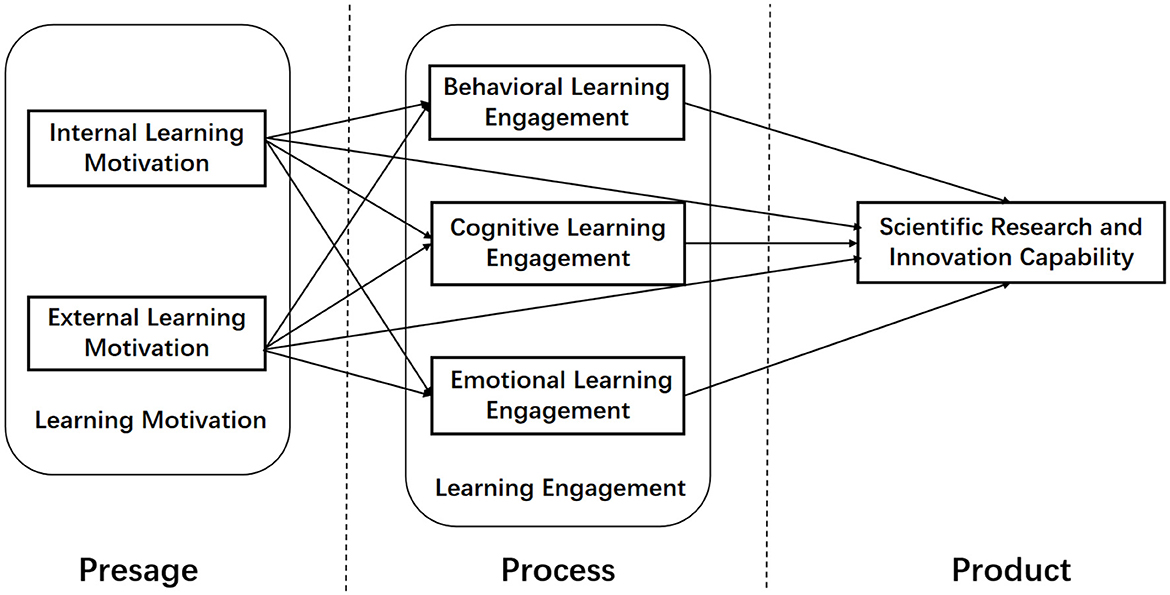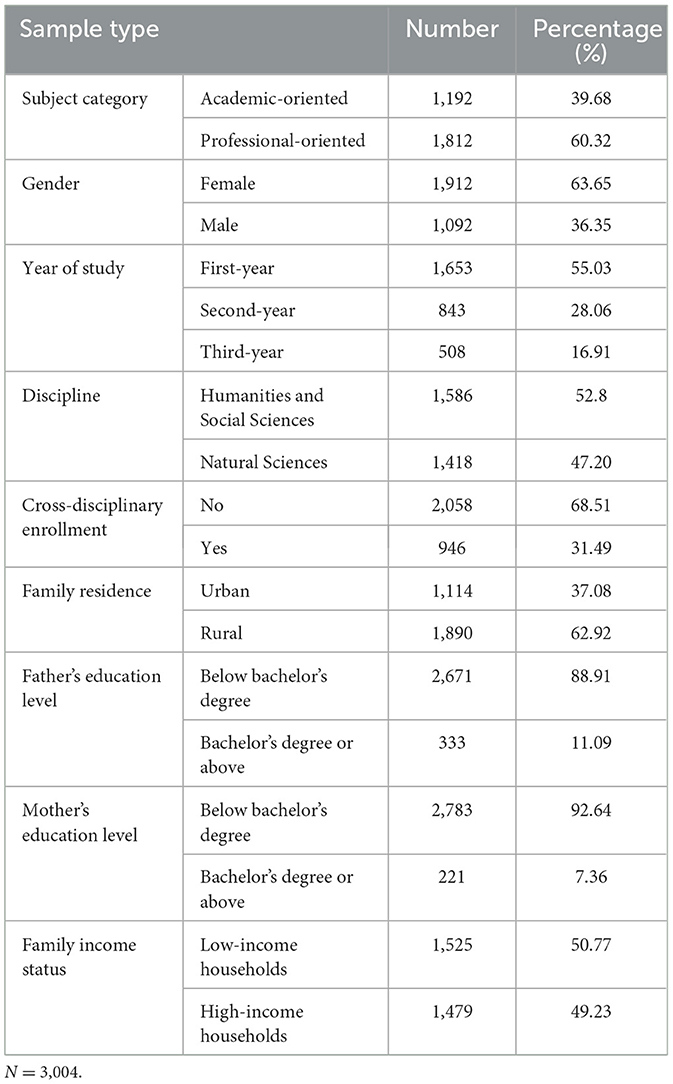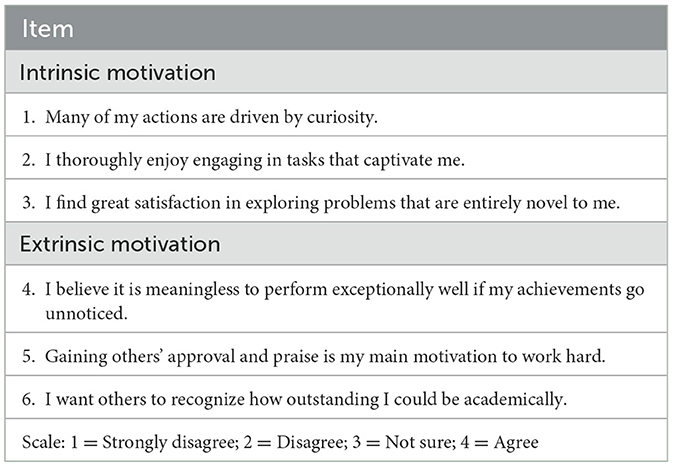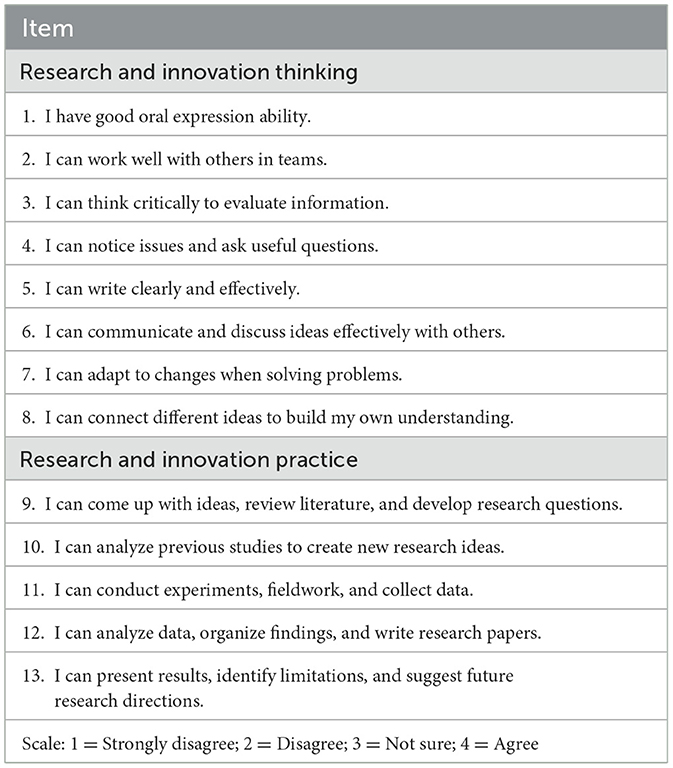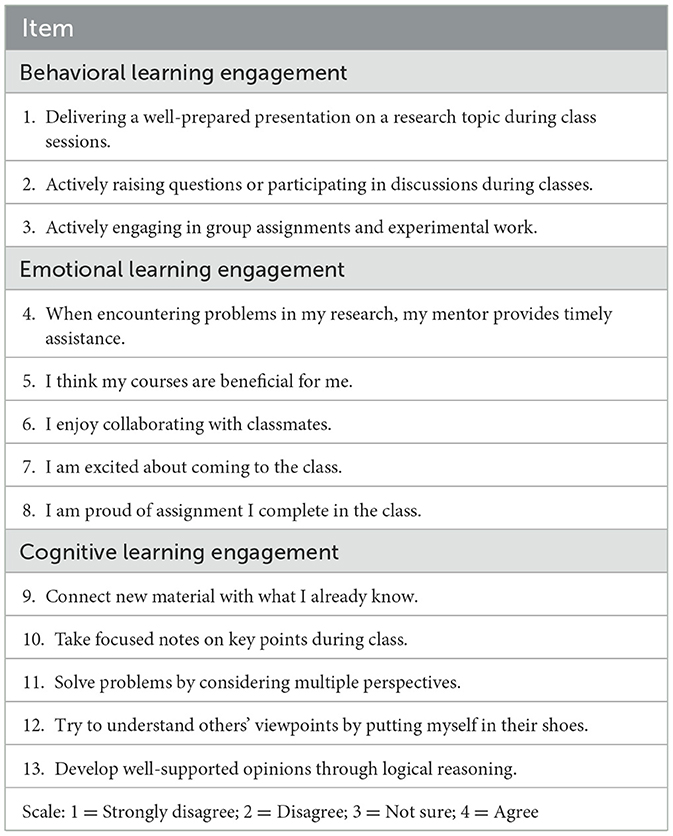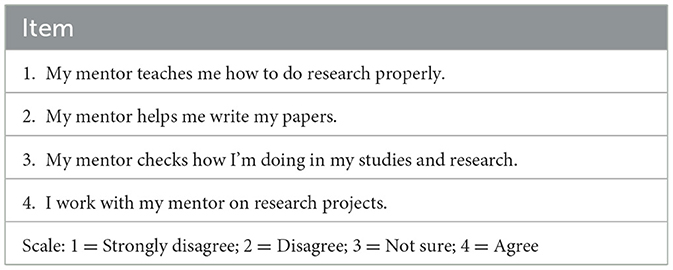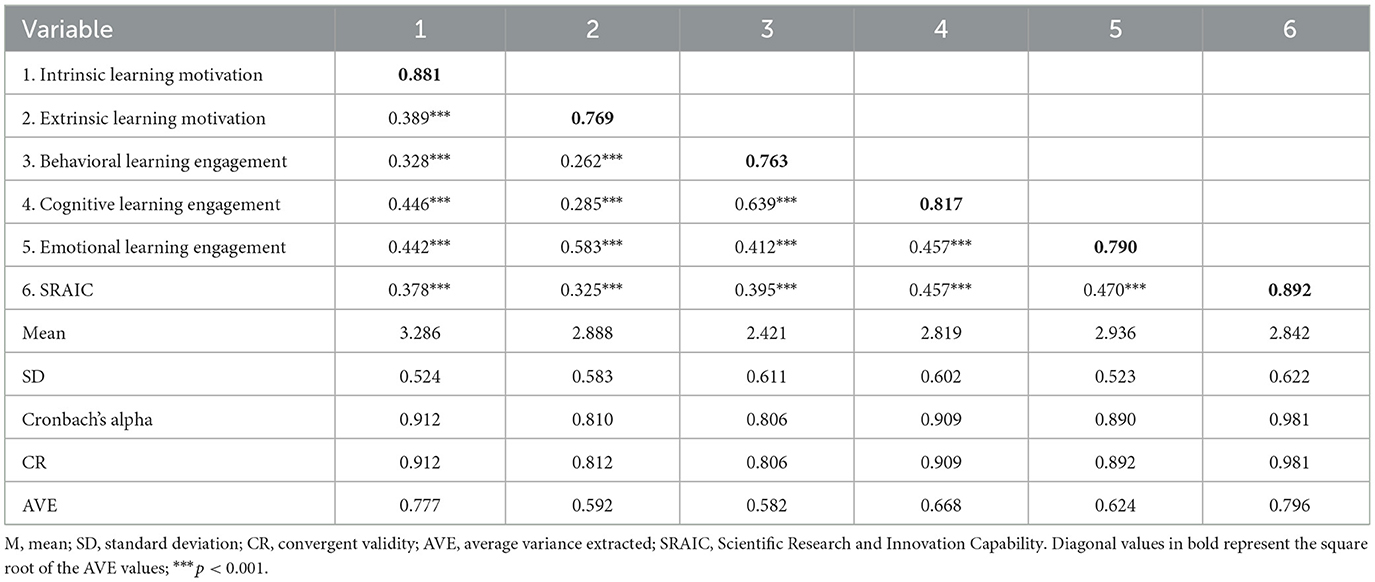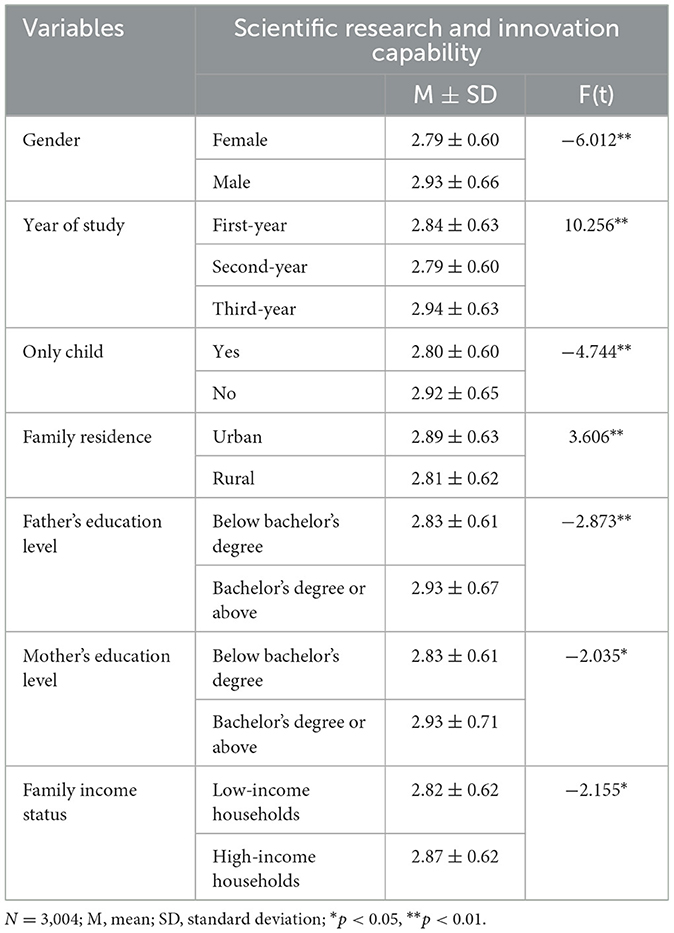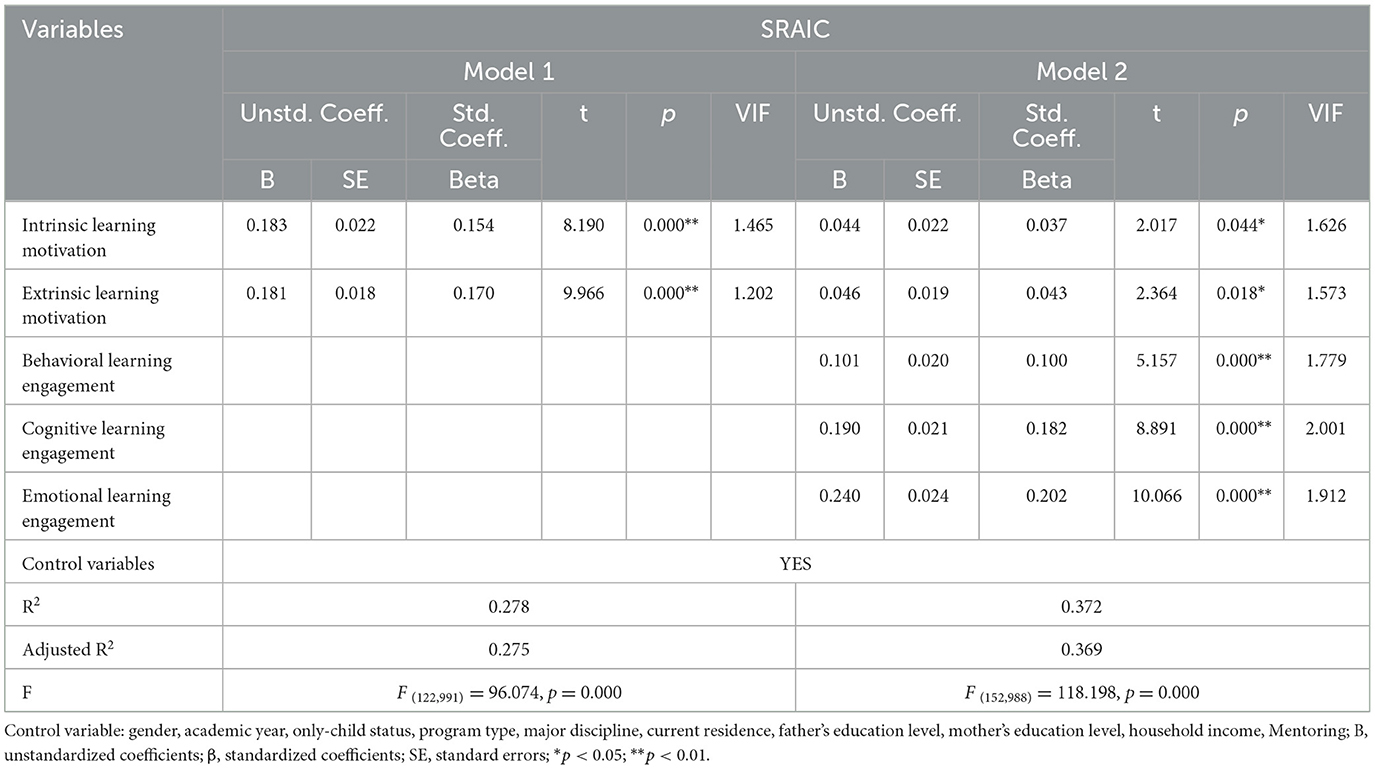- Institute of Education, Fujian Normal University, Fuzhou, China
Introduction: Participating in scientific research is a high-impact educational activity for master's students, and cultivating their scientific research innovation capabilities is a key goal of postgraduate education. While China boasts a large scale of higher education, apart from a small number of research-oriented universities, the majority of higher education institutions are local colleges and universities. Previous studies have mostly focused on the education of master's students in research universities, with insufficient attention paid to the cultivation of research innovation capabilities among master's students in local institutions. Existing research has indicated that learning motivation has a positive impact on learning engagement, and that learning engagement plays an active role in scientific research innovation capabilities. However, few studies have systematically examined the mediating function of learning engagement in this association.
Methods: This study employed a questionnaire survey method, collecting data from 3,301 master's students across eight universities in Fujian Province, with a final sample size of 3,050 valid responses. The data were analyzed using SPSS software through reliability and validity tests, descriptive statistics, and linear regression to explore the relationships among master's students' learning motivation, learning engagement, and scientific research and innovation capability.
Results: Master's students in local colleges and universities demonstrate a relatively low level of scientific research innovation capability. Moreover, factors such as academic year, gender, and family background exert heterogeneous impacts on their scientific research innovation capability. Both intrinsic and extrinsic learning motivation positively predict scientific research innovation capability, with intrinsic learning motivation exerting a stronger effect. Specifically, the direct effect of intrinsic learning motivation on scientific research innovation capability outweighs its mediating effect, whereas the mediating effect of extrinsic learning motivation on scientific research innovation capability is more significant than its direct effect. Furthermore, different types of learning engagement exhibit heterogeneous influence mechanisms in the relationship between graduate students' learning motivation and scientific research innovation capability.
Discussion: Postgraduate students' learning motivation positively predicts their scientific research innovation capability, and learning engagement exerts a significant impact on scientific research innovation ability. Learning engagement plays a mediating role between learning motivation and scientific research innovation ability. It serves as a “bridge,” facilitating the transformation of extrinsic learning motivation into intrinsic learning motivation and contributing to the improvement of postgraduate students' scientific research innovation capability. Nevertheless, the samples in this study are all from local universities in Fujian Province, which limits the promotion and application of the research conclusions.
Introduction
Scientific research and innovation capability (SRAIC) plays a pivotal role in advancing national scientific and technological advancement, serving as a cornerstone for enhancing a nation's soft power and comprehensive national strength. Furthermore, such innovation capacity can be translated into tangible productive forces, thereby driving sustained socioeconomic growth through the effective integration of scientific breakthroughs with industrial applications. In 2018, The Organisation for Economic Co-operation and Development (OECD) released the latest document “The Future of Education and Skills-Education 2030,” which states that creativity is an essential skill for learners and recommends it as a focus in education (Hughson and Wood, 2022). Cultivating students' creativity is one of the important goals of graduate education.
In China, master's students serve not only as research trainees but also as practitioners and drivers of technological innovation. Chinese master's programs typically adopt a 3-year structure and are categorized into academic and professional tracks based on training objectives (Zhu et al., 2025). An academic master's degree focuses on academic research and aims to cultivate students' SRAIC, forming the primary pipeline for doctoral candidates, while a professional master's degree emphasizes applied skills to address industry demands for advanced technical expertise. However, enhancing research competence remains a core goal for both tracks. Despite China's large-scale higher education system, the majority of institutions are regional universities (Fang, 2012), which play a central role in training academic talent but exhibit notable disparities in research resource allocation and innovation capacity compared to research universities (Huang, 2015). Previous studies have predominantly focused on the education of master's students in research universities, and insufficient attention has been paid to the cultivation of SRAIC of master's students in local institutions (Zhu et al., 2025). Investigating these universities thus provides certain representativeness and practical significance.
In previous studies, SRAIC has been found to be primarily influenced by factors such as individual psychological characteristics and learning engagement (Wentzel and Wigfield, 1998; Han et al., 2024). It is noteworthy that SRAIC is particularly closely related to learning motivation and learning engagement (Han, 2024; An, 2015; Wang et al., 2022). Also, empirical data indicate that learning engagement significantly promotes SRAIC (Amabile, 1983; Han et al., 2024). However, numerous factors influence learning engagement, and from the perspective of individual characteristics, learning motivation is undoubtedly the most central and critical one. Further analysis reveals that the positive impact of learning motivation on learning engagement cannot be overlooked (Lei et al., 2024; Wu, 2019). Learning motivation, as an internal need of students, cannot directly be transformed into scientific research achievements. However, it serves as a crucial driving force for students' SRAIC. Therefore, there is a transformation process in which learning motivation needs to be channeled through learning engagement to enhance SRAIC, that is, learning engagement plays a mediating role between learning motivation and the SRAIC (Han et al., 2024; Li et al., 2025).
However, despite these theories providing useful perspectives for understanding the relationship between learning motivation, learning engagement, and SRAIC, there are still some limitations in previous studies exploring the specific relationships between these variables and SRAIC. First, these studies often only focus on learning gains without delving into specific learning outcomes, such as the cultivation of SRAIC (Wentzel and Wigfield, 1998; Chen and Zhao, 2024; Wu et al., 2020). Secondly, these studies mainly concentrate on undergraduates from “Double First-Class” and research-oriented universities, rarely paying attention to students from regional universities. This tendency may overlook the special needs and backgrounds of students in regional universities. Master's students are the main force in scientific research and innovation, so it is of great significance to study their SRAIC (Atik and Çelik, 2021; Pascarella et al., 2010; Liu et al., 2023). Finally, while existing studies confirm the positive impacts of learning motivation on learning engagement and its subsequent effect on SRAIC, the mediating role of learning engagement remains rarely understudied. Therefore, to more accurately reveal the dynamic relationships among these variables and provide more specific guidance for educational practice, future research needs to focus on the cultivation of SRAIC, pay more attention to master's students and students from regional universities so as to comprehensively understand the relationships among learning motivation, learning engagement, and SRAIC.
Literature review and conceptual framework
The relationship between learning motivation and learning engagement among master's students
Learning motivation is the internal or external driving force that stimulates individuals to engage in learning activities. Its essence is to meet the psychological needs of autonomy, competence, and relatedness (Deci et al., 1991). (Bakar 2014) added that motivation reflects in students' choices of learning tasks, the time and effort they devote to them, their persistence on learning tasks, and in coping with the obstacles they encounter in the learning process. It reflects the intrinsic motivation for individuals to participate in cognitive activities. Appropriate classification of learning motivation also facilitates further research. Some scholars, based on self-determination theory (SDT), classify learning motivation into intrinsic and extrinsic types (Amabile, 1983). Intrinsic motivation stems from personal interests or curiosity-driven exploration, whereas extrinsic motivation arises from external rewards or instrumental outcomes, emphasizing behavioral consequences over inherent value. In addition, some scholars, according to achievement goal theory, divide learning motivation into task-oriented (focusing on ability validation through task completion) and self-oriented (prioritizing personal growth as an evaluative benchmark) (Elliot et al., 2011). Beyond cognitive psychology, other scholars establish the L2 Motivational Self System from a social psychology perspective, dividing learning motivation into ideal L2 self (driven by aspirations to align actual and ideal selves) and ought-to L2 self (triggered by external expectations or avoidance of negative outcomes) (Dörnyei, 2014). Despite classification variations, academic motivation universally converges into two domains: intrinsic motivation (self-development focus) and extrinsic motivation (external reward focus).
Learning engagement refers to students' sustained psychological investment and focused efforts in academic pursuits. As a multidimensional construct, it encompasses behavioral, emotional, and cognitive engagement—interrelated yet distinct dimensions (Fredricks et al., 2004). It emphasizes psychologically active participation manifested through observable behaviors, particularly in emotional commitment (Fredricks and McColskey, 2012). In recent years, the influencing factors of learning engagement have been a widely-studied topic among researchers. Scholars have found that in addition to genetic and educational factors, students' individual psychological characteristics also have a significant impact on learning engagement (Atik and Çelik, 2021). In this research, learning engagement specifically denotes master's students' proactive and persistent involvement in coursework and research activities, characterized by high concentration and dedication.
Existing research indicates that learning motivation significantly influences engagement among master's students. However, as most studies predominantly employ undergraduate samples, their conclusions may not adequately extend to postgraduate populations. For instance, (Singh et al. 2022) observed negative correlations between passive motivation and learning engagement among undergraduates, whereas extrinsic motivators such as publication pressure may transform into positive drivers for master's students due to the longitudinal nature of research tasks (Chang et al., 2011). Furthermore, examining the motivation-engagement relationship through dual-motive theory, (Saeed and Zyngier 2012) demonstrated that intrinsic motivation positively enhances learning engagement, while extrinsic motivation's impact exhibits significant variations across educational stages and populations. This evidence underscores the necessity for deeper investigation into the distinctive characteristics of postgraduate education. Learning motivation can stimulate, guide, and sustain self-regulated learning, influencing the duration and intensity of learning (Zimmerman and Schunk, 2013). Mixed-methods research reveals that intrinsic motivation correlates with higher engagement, while extrinsic motivation is associated with lower engagement (Zhang and Cherng, 2024). This perspective stands in contrast to (Saeed and Zyngier 2012) contention that extrinsic motivation operates heterogeneously across individuals. Moreover, scholars have conceptualized learning motivation through dichotomous valence categories, positing that adaptive metacognitive and behavioral manifestations positively correlate with learning engagement, whereas maladaptive patterns exhibit negative associations (Singh et al., 2022). While extant research consistently affirms the facilitative role of intrinsic motivation in fostering learning engagement, substantial divergence persists regarding extrinsic motivation's effects.
In summary, the intricate relationship between learning motivation and engagement has been extensively examined, yet prevailing studies predominantly employ rudimentary motivational classifications while overlooking engagement's dynamic responsiveness to motivational origins, typologies, and intensities. Simultaneously, learning engagement constitutes a multidimensional construct encompassing emotional, cognitive, and behavioral dimensions. This synthesis suggests their relationship is both profound and multifaceted. Consequently, future research must elucidate the mediating mechanisms through which learning motivation influences learning engagement across diverse educational contexts and populations, thereby advancing comprehensive theoretical understanding.
The relationship between learning motivation and capability of scientific research and innovation among master's students
Innovation capability is conceptualized as the ability to synthesize ideas and knowledge into novel solutions (Wadaani, 2015). It has also been described as the capacity to transcend conventional concepts, rules, boundaries, or relationships, enabling individuals to create or adapt more meaningful new ideas (Marin-Garcia et al., 2016). Building on these definitions, some scholars propose that innovation capability is a complex and multifaceted set of abilities that span the entire innovation process, from the generation of new ideas to the achievement of outcomes (Pérez-Peñalver et al., 2018). Based on previous research, this study defines master's students' research and innovation capability as the ability to systematically complete the entire process from problem identification to outcome transformation in research activities by integrating knowledge, practical skills, and innovative thinking. This capability encompasses both research innovation practices and research innovation thinking.
Learning motivation significantly influences master's students' research and innovation capability (Han et al., 2024). (Dai et al. 2022) highlight learning motivation as a critical factor affecting graduate students' research innovation capability. They discuss the distinct roles of intrinsic and extrinsic motivation in fostering innovative behaviors among college students. For instance, intrinsic motivation (e.g., curiosity and intellectual interest) is a key driver of creativity and innovation, while extrinsic motivation exhibits negligible effects on innovative behaviors (Dai et al., 2022). However, other studies suggest that extrinsic motivation can positively moderate intrinsic motivation: When intrinsic and extrinsic motivations align, the higher the perceived probability of obtaining relevant rewards, the greater the positive impact on innovative achievements (Niles, 1995). (Huang et al. 2015) examine the influence of learning motivation on innovative behaviors across different cultural contexts, noting that instrumental motivation is more likely to translate into innovative behaviors through social activities, like competitions, among East Asian students, while Western students rely more on interest-driven motivation. (Cheng and Yi 2018) provide empirical evidence demonstrating a significant positive correlation between learning motivation and innovation capability. (Sung et al. 2019) further confirm the correlation between students' learning motivation and creativity, finding that learning motivation also serves as a predictor of creativity (Wu et al., 2020; Sung et al., 2019). At the same time, learning motivation is also an important factor in judging whether students can continue to learn, and it also greatly affects the enthusiasm of master's students in scientific research and their scientific research achievements (Han, 2024). For instance, in studies on interdisciplinary doctoral training, a non-interdisciplinary doctoral student with stronger motivation demonstrates superior innovation capabilities and output (An, 2015).
The mediating role of learning engagement
Master's students' academic motivation influences research innovation capability both directly and indirectly through learning engagement. According to SDT, intrinsic motivation directly activates learning engagement by fulfilling needs for autonomy and competence, manifesting in research activities such as frequent literature review and experimental design. Extrinsic motivation, on the other hand, requires goal-oriented regulation to transform into effective learning engagement. Both intrinsic and extrinsic motivations work together to drive learning engagement, which, in turn, enhances research and innovation capability through three mediating mechanisms: knowledge integration, skill reinforcement, and emotional commitment. Existing studies widely employ mediation models to examine learning engagement's role between psychological variables (e.g., academic emotions, self-efficacy) and academic outcomes (Wang, 2022; Han, 2024; Meng and Zhang, 2023). In the research context, learning engagement (particularly cognitive engagement) mediates the relationship between organizational support and innovation capability, with highly engaged individuals demonstrating greater originality (Zhou and George, 2001). Student engagement mediates the effectiveness of blended learning and academic performance, meaning that the effectiveness of blended learning enhances student engagement, thereby improving learning outcomes (Han, 2024). Additionally, learning engagement significantly and positively influences master's students' research innovation capability (Chen and Zhao, 2024; Amrai et al., 2011), and the duration of scientific research learning engagement has a significant positive impact on the acquisition of scientific research ability (Keller, 1997; Pattnaik and Sahoo, 2021).
Compared with undergraduates, master's students encounter research tasks of heightened complexity and challenge, necessitating elevated levels of learning engagement. Through systematically structuring acquired knowledge while continuously assimilating, disseminating, and synthesizing novel insights during their research endeavors, master's students can substantially enhance self-directed learning capabilities, invigorate academic initiative, cultivate innovative thinking, and develop deliberative cognitive habits—thereby augmenting research productivity outcomes. Crucially, learning engagement frequently functions as a mediator in scholarly investigations. We thus hypothesize its mediating effect between learning motivation and SRAIC, particularly within the master's education context where such mediation manifests more prominently.
Given the marked disparities between graduate and undergraduate cohorts in research demands, motivational drivers, and developmental stages, prior research has predominantly centered on undergraduates, neglecting the distinctive characteristics of postgraduate populations. To address this theoretical gap, the present study scrutinizes the underlying mechanisms connecting learning motivation, learning engagement, and scientific research and innovation capability specifically among master's students.
Conceptual framework
This study establishes an analytical framework examining master's students' learning motivation, learning engagement, and scientific research and innovation capacity through integrating SDT with the Presage-Process-Product model. SDT emphasizes autonomy, competence, and relatedness as fundamental psychological needs driving motivation, while the Presage-Process-Product model offers a structured pathway for analyzing learning processes. The Presage-Process-Product model serves as an operationalized extension of SDT within graduate research contexts, enabling theoretical nesting. Within presage variables, learning motivation intrinsically aligns with psychological needs: intrinsic motivation originates from fulfilled autonomy needs, manifested as subject-specific fascination or exploratory impulses; extrinsic motivation operates through relatedness needs, where meeting supervisors' research expectations fosters team recognition and enhances belongingness. Individual academic backgrounds and research experience additionally shape perceived research competence, indirectly influencing competence needs. Regarding process variables, learning engagement manifests multidimensional characteristics under motivational influence. Behaviorally, intrinsic motivation drives proactive research activities including literature review and experimental design, while extrinsic motivation facilitates collaborative engagement through academic exchanges and joint projects. Emotionally, experiencing team support or achieving research milestones generates scholarly enthusiasm and academic identification, elevating emotional investment. Cognitively, competence needs fulfillment prompts critical analysis, theoretical construction, and deepening conceptual understanding. SRAIC as the product variable epitomizes psychological need fulfillment. Publications directly validate research competence, satisfying competence needs, while innovative thinking originates from sustained autonomy-driven exploration.
Building upon this theoretical integration, we propose a hypothetical model positioning learning motivation as the presage variable encompassing intrinsic and extrinsic dimensions driven by psychological needs. Learning engagement as the process variable comprises behavioral, cognitive, and emotional dimensions manifesting satisfied psychological needs. SRAIC as the product variable represents accumulated engagement outcomes. Crucially, learning motivation enhances SRAIC through mediating pathways across learning engagement (Li et al., 2025). This elucidates a motivation driving engagement, engagement transforming capacity dynamic, providing theoretical scaffolding for investigating these relationships, with subsequent empirical validation planned to advance understanding of master's learning mechanisms.
Self-determination theory (SDT) posits that autonomous decision-making driven by internal needs and values significantly shapes behavior, categorizing learning motivation into extrinsic and intrinsic types. Engagement theory further divides learning engagement into behavioral, cognitive, and emotional dimensions. As shown in Figure 1, to analyze the relationships between learning motivation, engagement, and SRAIC, this study integrates prior research to propose the following hypotheses:
H1: Master's students' learning motivation has a significant positive influence on learning engagement.
H2: Master's students' learning motivation has a significant positive influence on SRAIC.
H3: Master's students' learning engagement has a significant positive influence on SRAIC.
H4: Master's students' learning engagement mediates the relationship between learning motivation and SRAIC.
Method
Data and sample
The survey data were derived from the 2023 “Master's Students' Learning Experiences and Perceptions Questionnaire Survey,” encompassing 3,301 graduate students across eight regional universities in Fujian Province. After excluding 297 invalid responses (containing missing values or patterned answers), a final valid sample of 3,004 participants was obtained, yielding a validity rate of 91%. The demographic characteristics of the sample are presented in Table 1.
Reliability and validity
In empirical research, scientifically rigorous measurement instruments are crucial for ensuring the reliability of research findings. This study adapts and refines well-established international and domestic scales to suit the characteristics of master's students in Chinese higher education, localizing tools for measuring core variables such as learning motivation, learning engagement and SRAIC. These adapted scales underwent rigorous reliability and validity tests. To enhance methodological transparency, the specific items of each scale are presented below, enabling readers to understand the content and structure of the measurement framework more intuitively.
Independent variable
The learning motivation scale was primarily adapted from the “Work Preference Inventory” developed by (Amabile et al. 1994), initially comprising 30 items. To align with Chinese educational contexts, some scholars have referred to and localized this scale (Liu et al., 2011; Zhou et al., 2020; Tang and He, 2023). For this study targeting regional university master's students, we refined it to 6 items through literature review and interview analysis. The six selected items effectively capture the motivational characteristics of master's students in Chinese regional universities. To ensure scale reliability and validity, we conducted a pilot test and refined the wording based on feedback. The intrinsic motivation subscale includes three items (e.g., “Many of my actions are driven by curiosity.”) assessing interest-driven learning, knowledge-seeking orientation, and competence development. The extrinsic motivation subscale comprises three items (e.g., “Gaining others' approval and praise is my main motivation to work hard.”) measuring social approval, career advancement goals, and achievement-oriented aspirations. Analysis demonstrated acceptable internal consistency (Cronbach's α = 0.912 for intrinsic, 0.810 for extrinsic; total α = 0.828) and confirmatory factor analysis (CFA) validity (SRMR = 0.033; GFI = 0.990; NFI = 0.992; CFI = 0.992). All items were measured on a 4-point Likert scale ranging from 1 (strongly disagree) to 4 (agree). The specific items are presented in Table 2.
Dependent variable
The SRAIC scale in this study draws on definitions from prior research (Wadaani, 2015; Marin-Garcia et al., 2016; Pérez-Peñalver et al., 2018) and is structured on a self-developed framework. When constructing this scale, we mainly referred to the two dimensions of “research and innovation thinking” and “research and innovation practice.” Guided by the Research Self-Efficacy Scale (RSES) (Bieschke, 1993), which originally contained 52 items, we adapted the scale through expert consultations, literature analysis, and interviews with Chinese graduate students, refining it to 13 context-specific items. A pilot test ensured reliability and validity before finalization. The research and innovation thinking subscale includes 8 items such as “I have good oral expression ability”; research and innovation practice subscale includes 5 items such as “I can conduct experiments, fieldwork, and collect data.” Analysis demonstrated acceptable internal consistency (Cronbach's α = 0.973 for the Research Innovation Thinking subscale, 0.981 for the Research Innovation Practice subscale, and total α = 0.981) and confirmatory factor analysis (CFA) validity (SRMR = 0.017, GFI = 0.953; NFI = 0.985, CFI = 0.986). All items were measured on a 4-point Likert scale ranging from 1 (strongly disagree) to 4 (agree). The specific items are presented in Table 3.
Mediating variable
The master's student learning engagement scale primarily references the Student Engagement Scale (SES) developed by (Gunuc and Kuzu 2015), which originally contained 59 items and the Burch Engagement Survey for Students (BESS) developed by (Burch et al. 2017), which originally contained 24 items. Given the differences between the Eastern and Western educational cultures and the characteristics of postgraduate study (Chang et al., 2011), localized adaptation of Western scales is critical for alignment with Chinese educational contexts (Gjersing et al., 2010). Targeting master's students at Chinese regional universities, we systematically modified existing scales through literature synthesis and interview analysis, rigorously screening items to finalize 13 items that reflect local learning engagement characteristics. The 13-item scale comprises three dimensions: behavioral engagement, cognitive engagement, and emotional engagement. The behavioral engagement subscale includes 3 items such as “Actively raising questions or participating in discussions during classes.” The cognitive subscale includes 5 items such as “Connect new material with what I already know.” The emotional subscale includes 5 items such as “I am excited about coming to the class.” Cronbach's α coefficients reached 0.806 for the behavioral engagement subscale, 0.909 for the cognitive engagement subscale, and 0.890 for the emotional engagement subscale. The confirmatory factor analysis (CFA) results indicated excellent structural validity of the scale, with standardized root mean square residual (SRMR = 0.030) and fit indices (GFI = 0.955, NFI = 0.962, CFI = 0.965) all achieving ideal thresholds. The total Cronbach's α coefficients is 0.910. All items were measured on a 4-point Likert scale ranging from 1 (strongly disagree) to 4 (agree). The specific items are presented in Table 4.
Control variables
Numerous studies have found that master students' personal background factors play a critical role in their growth and development, such as gender, grade, place of residence, whether they are only children, parents' education levels, and family economic status (Ceci and Williams, 2011; Mare, 1981). Mentoring also significantly impacts graduate student development, with supervisor productivity and relational closeness positively enhancing training outcomes (Chen et al., 2025). (Jiang and Wang 2025) further demonstrate that mentoring improves post-graduation career satisfaction, while (Yang et al. 2024) identify supportive supervisory styles as predictors of student innovation. However, this study focuses on learning engagement's mediating role. Thus, mentoring is included as a control variable in regression analyses to explore the impact of learning motivation and learning engagement on SRAIC under the control of mentoring variables. The specific items are presented in Table 5.
Data analysis strategy
This study employs a three-step analytical approach. First, SPSS is used to analyze data reliability and validity for key variables including learning motivation, learning engagement and SRAIC. Reliability is assessed through Cronbach's alpha and composite reliability (CR), while convergent validity uses average variance extracted (AVE) and discriminant validity applies the Fornell-Larcker criterion. Second, variable distributions are examined by calculating means and standard deviations to understand central tendencies and dispersion. Furthermore, correlation analysis explores inter-variable relationships within the dataset using SPSS. Third, our research hypotheses are tested through path analyses by using Amos28.
Result
Analysis of the current status and differences
As shown in Table 6: In terms of learning motivation, intrinsic motivation was higher than extrinsic motivation; In terms of learning engagement, emotional engagement was the highest, while behavioral engagement was the lowest. The average value of SRAIC is 2.842, indicating a moderately high level but not yet reaching a satisfactory state. The correlation analysis indicates that there are significant positive correlations between motivations, learning engagement, and SRAIC. Among them, SRAIC has the strongest correlation with cognitive learning engagement and emotional learning engagement, and the weakest correlation with extrinsic learning motivation. These findings provide a foundation for further exploration of the pathways between variables and for verifying the mediating role of learning engagement.
The analysis of differences in research innovation capability among students with different backgrounds using t-tests and ANOVA revealed the following. According to Table 7, significant differences in SRAIC were observed for gender, indicating that male students (M = 2.93) scored higher than female students (M = 2.79), suggesting better performance among males; significant differences were also found across year of school, with 3rd-year graduate students (M = 2.94) outperforming 1st-year (M = 2.84) and 2nd-year students (M = 2.79); additionally, other background variables showed significant differences: only-children scored lower (M = 2.80) than non-only-children (M = 2.92); urban family backgrounds (M = 2.89) scored higher than rural family backgrounds (M = 2.81); individuals with parents holding bachelor's degrees or higher scored significantly higher than those with parents below bachelor's level; and high-income families (M = 2.87) scored higher than low-income families (M = 2.82).
The impact of master's students' learning motivation on their scientific research and innovation ability
Regression models were constructed to analyze the relationship between master's students' learning motivation, engagement, and SRAIC. As shown in Table 8, Model 1 indicates that both intrinsic and extrinsic motivation have significant positive effects on SRAIC, with intrinsic motivation exerting a stronger influence. The R2 value of 0.278 for learning motivation suggests that these two types of motivation collectively explain 27.5%−27.8% of the variance in SRAIC. In Model 2, behavioral, cognitive, and emotional engagement all show significant positive effects on SRAIC, with emotional engagement demonstrating the strongest impact. The R2 value of 0.372 for learning engagement reveals that these three dimensions jointly account for 36.9%−37.2% of the variance in SRAIC.
The mediating role of master's students' learning engagement between learning motivation and research innovation capability
Overall (as shown in Figure 2), the path coefficient of learning motivation on learning engagement is 0.577, and the direct path coefficient on SRAIC is 0.162. The path coefficient of learning engagement on scientific research and innovation ability is 0.448, indicating that learning motivation indirectly affects SRAIC through learning engagement, while also having a direct promotional effect.
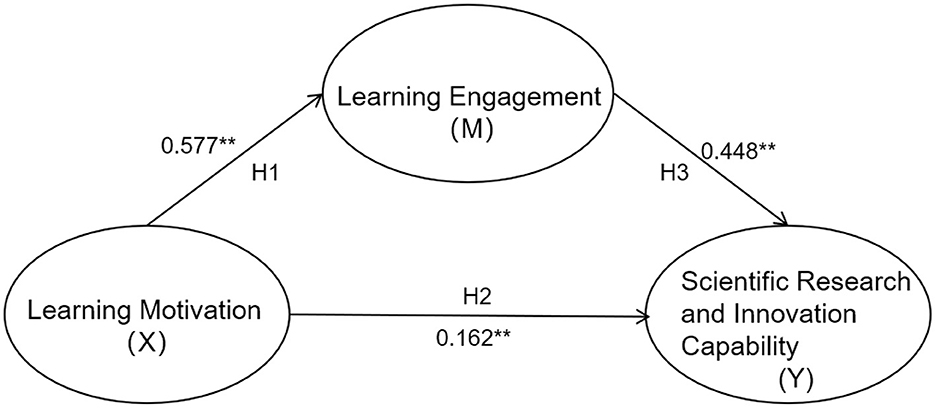
Figure 2. The mediating effect of learning motivation, learning engagement, and SRAIC among master's degree students. *p < 0.05, **p < 0.01, **Means at the significant level of 0.01. *Means at the significant level of 0.05.
As shown in Table 9, the direct effect of intrinsic learning motivation on scientific research innovation capability is greater than its mediating effect, indicating that stimulating and maintaining intrinsic learning interest and curiosity are critical factors in enhancing innovation capability; on the other hand, the mediating effect of extrinsic learning motivation on research innovation capability outweighs its direct effect, suggesting that extrinsic motivation primarily influences research innovation capability through learning engagement as a mediator, highlighting its reliance on individuals' active participation and deep engagement driven by external incentives. Additionally, different types of learning engagement exhibit heterogeneous mechanisms between learning motivation and scientific research innovation capability. Three notable findings emerged: firstly, cognitive and emotional engagement exerted the strongest effects, while behavioral engagement had a relatively smaller impact; secondly, intrinsic motivation demonstrated the most significant mediating effect on scientific research innovation capability through cognitive engagement; thirdly, extrinsic motivation's mediating effect via emotional engagement was the largest, accounting for over half of the total effect. In summary, these findings underscore the pivotal role of learning engagement—particularly emotional engagement—in translating motivation into scientific research innovation capability, emphasizing the need to cultivate emotional factors in educational practice. Cognitive engagement also remains a vital mediator, showing strong effects in both intrinsic and extrinsic motivation pathways.
Discussion
This study establishes an empirical model of “learning motivation—learning engagement—scientific research innovation capability” for master's students, revealing how intrinsic and extrinsic motivations influence research innovation through behavioral, cognitive, and emotional engagement. It offers empirical support for enhancing graduate education and fostering innovative talent. Key findings are as follows:
First, current status and disparities in master's students' capability of scientific research innovation. The average capability is moderately high is moderately high but not yet optimal. This may reflect institutional contexts, as participants were from regional universities, which typically lag behind research-intensive or Double First-Class institutions in cultivating such competencies (Yang and Welch, 2012). Additionally, Significant disparities emerged across gender, grade and family background, aligning with prior studies (Ceci and Williams, 2011; Mare, 1981). In term of gender: male students exhibit stronger research innovation capability than female students, particularly in practices and thinking, as men often prefer task-oriented fields like engineering, while women lean toward people-oriented fields like social sciences and healthcare (Stout et al., 2016). However, some studies suggest that women outperform men in certain scientific fields, yet they receive less recognition and reputation than their male counterparts (Ross et al., 2022). In term of grade: 3rd-year students outperform 1st- and 2nd-year students, likely due to greater research involvement. First-year students focus on coursework, limiting early research development; 2nd-year students face a motivation dip as they transition to research, often hindered by pressure and uncertainty. In contrast, 3rd-year students typically gain increased opportunities to participate in faculty-led research projects and thesis writing. From the perspective of SDT, when students operate within relationally supportive research teams that fulfill their need for belongingness, their intrinsic autonomy is significantly activated, manifesting as heightened willingness to engage, greater self-directed action, and sustained effort. This frequent and immersive research practice creates a positive feedback loop through competence satisfaction, further reinforcing intrinsic motivation and ultimately establishing a virtuous cycle: relational support → autonomous engagement → competence enhancement → motivation reinforcement. Third-year students' extensive involvement in research projects and academic writing also enhances their technical skills and innovative capacities through iterative practice. In term of family: Factors such as family economic conditions, parents' educational background, cultural atmosphere, and parents' support attitude all have a significant impact on master's students' SRAIC. The gaps in parents' educational background and family income directly limit the access to scientific research resources. The differences in the inter-generational transmission of family cultural capital led to the differentiation of academic habits. Children from families with higher-educated parents have significant advantages in some aspects, such as the standardization of literature management and the rigor of research design.
Second, the significant positive influence of master's students' learning motivation on scientific research innovation capacity. Results indicate that both intrinsic and extrinsic learning motivations exert significant positive effects on scientific research innovation capacity, underscoring learning motivation's role as a critical psychological driver for scientific research innovation capacity. Notably, intrinsic motivation demonstrates a stronger effect than extrinsic motivation, suggesting that internal drives—such as intellectual curiosity and exploratory desire—are pivotal in fostering innovation. Students with robust intrinsic goals exhibit heightened agency and execution, engaging cognitively, behaviorally, and emotionally in research activities. While extrinsic motivation shows weaker direct effects, it remains consequential: external rewards, like accolades, project incentives, can enhance participation and spur innovative behaviors. Such external stimuli may activate latent creative potential, indirectly advancing SRAIC. Contrary to existing reporting, regarding the impact of intrinsic and extrinsic learning motivations on SRAIC, the results of this study are inconsistent with existing research. Some scholars found that extrinsic learning motivation does not have a direct impact on SRAIC, but has an indirect impact through participating in extracurricular activities, emphasizing the regulatory role of cultural context as a mediator (Deci et al., 1991; Pintrich, 2003). Further exploration reveals that intrinsic and extrinsic motivations are not necessarily opposed, and the roles of both need to be considered simultaneously. It is essential to recognize the roles of both motivations and promote the transformation of extrinsic to intrinsic motivation. SDT posits that extrinsic motivation can be internalized and may stimulate or sustain intrinsic motivation when external environments satisfy three basic psychological needs: autonomy, competence, and relatedness (Kamberi, 2025). Research indicates that extrinsic motivation lacks inherent synergistic effects; however, relational rewards such as public recognition or personal praise can synergize with intrinsic motivation to enhance creativity and innovation, breaking the limitations of the traditional perception of the opposition between intrinsic and extrinsic motivation (Fischer et al., 2019). This analysis provides theoretical grounding for unraveling the complex mechanisms of master's students' learning motivation. Contrasting our findings with prior empirical work highlights our unique contributions: while (Chiu 2022) examined how digital support strategies fulfill basic psychological needs to enhance online engagement among 1,201 secondary students, our research investigates how learning motivation influences SRAIC through learning engagement specifically within the postgraduate academic context. Unlike Chiu's focus digital learning behaviors in primary education, we reveal the distinctive pathway through which master' students' motivations translate into research outcomes. Similarly, whereas studies on parental overprotection explore need frustration as a mediator between family environments and perfectionism (Casale et al., 2023), our work examines the interplay of intrinsic and extrinsic motivations in academic settings. These comparisons demonstrate SDT's differential applications across contexts and populations while underscoring our study's novel contribution to understanding research innovation drivers in higher education, thereby advancing SDT's theoretical framework in academic research contexts.
Third, the mediating role of learning engagement between learning motivation and SRAIC. Findings reveal that learning engagement significantly positively affects research innovation capability, and it plays a mediating role between learning motivation and research innovation capability, acting as a “bridge.” This means that learning motivation not only directly influences research innovation capability but also indirectly affects it through learning engagement. These findings align with previous research (Han et al., 2024; Amabile, 1983; Lei et al., 2024; Wu, 2019). Learning motivation drives engagement. Individuals with high learning motivation are often willing to invest more time and effort to tackle academic challenges, and this sustained enthusiasm is key to maintaining focus and vitality in learning. Research shows that learning motivation has a significant positive impact on metacognitive regulation, enabling learners to adjust their effort levels based on the intensity of their motivation (Martin et al., 2017). In this context, Autonomous learners exhibit heightened enthusiasm and focus as motivation increases. There is an interaction between learning engagement and learning motivation. Students can adopt active strategies according to the complexity of learning tasks and adjust their learning engagement. Students with high learning engagement are more likely to make active plans during the learning process to maintain a high level of learning motivation (Hua, 2019), highlighting their reciprocal reinforcement. Learning engagement directly promotes SRAIC. Through sustained investment of time, energy, and resources, students accumulate expertise, refine skills, and deepen disciplinary understanding, thereby advancing innovation capability. Regarding the types of learning engagement, existing research shows that students often exhibit higher behavioral and cognitive engagement but relatively lower emotional engagement during their training. High-achieving students may diligently complete tasks but lack interest and enthusiasm for the courses, while low-achieving students may show lower participation (Kourti, 2019). However, cognitive and emotional engagement have a greater impact on research innovation capability than behavioral engagement. Graduate education prioritizes independent inquiry and creative thinking over rote memorization, making cognitive and emotional engagement align more closely with these educational goals and have a more profound impact on scientific research innovation capability. Behavioral engagement, like attending lectures or submitting assignments, though necessary, may not directly enhance innovative thinking and research capability. Thus, educational practices should prioritize cultivating cognitive and affective engagement to holistically develop students' SRAIC.
Theoretical implications
This study confirms the mediating role of learning engagement between learning motivation and scientific research innovation capability, providing new insights into their relationship. Three theoretical implications are identified.
First, this study constructs a dynamic “motivation-engagement-innovation” transmission model, deepening theoretical understanding of the formation mechanisms underlying SRAIC. Existing literature often oversimplifies the relationship between learning motivation and research competence as linear. By introducing learning engagement as a mediating variable, this research reveals that motivational factors must undergo complex transformations—such as sustained cognitive investment and critical thinking cultivation—to ultimately generate innovation capability. This provides a theoretical key to explaining the paradox of “high motivation yet low innovation,” while expanding the application boundaries of motivation theory in research contexts.
Second, this study validates the multidimensional mediating effects of learning engagement, broadening the explanatory scope of mediation models in educational psychology. Unlike traditional single-path mediation frameworks, the research learning engagement exhibits a triple mediation mechanism in the transformation from motivation to innovation capability: cognitive engagement facilitates knowledge restructuring, emotional engagement sustains research resilience, and behavioral engagement diversifies innovation pathways. This layered mediation effect mode the oversimplified treatment of learning engagement in existing studies and offers a dynamic analytical framework to decode the “black box” of motivation transformation.
Third, this study provides theoretical guidance for graduate education practice. By revealing the driving mechanism of learning motivation and the mediating effect of learning engagement, it provides a theoretical basis for universities to formulate differentiated incentive strategies (such as strengthening the cultivation of intrinsic motivation and optimizing the allocation of scientific research resources), helping education policy—makers and educators better understand how to enhance master's students' SRAIC by stimulating and maintaining their learning motivation and increasing their learning engagement.
Practical implications
Beyond theoretical implications, our study also has several practical implications.
First, given the critical role of intrinsic learning motivation in fostering learning engagement and capability of scientific research and innovation among master's students, sustaining and stimulating such motivation can cultivate their enthusiasm for research and increase their scholarly commitment. Universities should implement targeted intervention measures. Foster research passion: Encourage students to select research topics aligned with their interests to enhance engagement. Demonstrate the practical applications of knowledge through case studies or field research. Regularly organize academic conferences and lectures, inviting distinguished scholars to share their research journeys, inspiring students to embrace the allure of scientific inquiry. Strengthen self-efficacy: organize academic salons or small-group meetings to allow students to experience incremental progress and achievements in their research, thereby boosting their confidence and intrinsic drive. Establish effective tutor-student relationship. Tutors should provide students with personalized academic guidance and growth support. For example, formulate research projects according to each master's student's background and interests, so that students can fully engage in scientific research, thereby stimulating their intrinsic learning motivation.
Second, intrinsic motivation often stems from curiosity and the desire to explore the unknown, which is an important prerequisite for scientific research and innovation. Promoting the transformation of extrinsic learning motivation into intrinsic learning motivation makes individuals more likely to show higher autonomy and innovation. Acknowledge the value of extrinsic motivators, like recognition, awards, as positive drivers that enhance focus and dedication to research. This not only helps to cultivate their scientific research and innovation thinking but also promotes their in-depth exploration in scientific research and innovation practice. Therefore, colleges and tutors should actively support students by giving them autonomy in scientific research activities, allowing them more space for choice and decision-making in the research process. Establish a reward mechanism to publicly recognize students' scientific research achievements as an effective means to encourage students to continuously invest in scientific research activities. In this way, we can not only make full use of the positive role of extrinsic motivation but also gradually guide students to develop more lasting intrinsic learning motivation. To further promote students' autonomy, we can break down complex tasks, such as paper writing and experimental design, into quantifiable stage goals. This not only allows students to experience a sense of achievement at each stage but also stimulates their continuous motivation for scientific.
Third, universities should create a good learning environment to enhance students' learning engagement. Universities should strengthen the professional construction of the teaching staff. Having a team of tutors with both virtue and talent is the core of improving the quality of postgraduate education. Therefore, universities should establish a comprehensive tutor evaluation system covering three dimensions: “virtue-academics-education,” and take the assessment of teachers' moral integrity as the core indicator for title promotion. Only when teachers possess these three qualities can a positive tutor-student relationship be established between students and teachers, which in turn promotes students' in-depth learning engagement. Universities should build an open and innovative research environment. Educators and scientific research institutions should encourage students to follow their research interests and give them full freedom to choose research topics that match their personal interests. Meanwhile, schools must guarantee students' access to essential academic resources. For master's postgraduate students, rich literature, advanced facilities, diverse funding, and a vibrant academic atmosphere are crucial for boosting learning engagement. These resources can not only reduce the negative impact of the external environment on learning, help students overcome living difficulties and psychological pressure but also ensure their free exploration and innovation in research activities, thereby enhancing their intrinsic learning motivation. These resources can mitigate external disruptions, ease students' hardships and stress, and enable free exploration and innovation, thus enhancing intrinsic motivation.
Limitations and future research
First, Chinese universities are categorized into research-oriented, applied, and comprehensive types. While regional universities constitute the majority of China's higher education system, their master's students generally demonstrate lower academic preparedness compared to those in top-tier research universities. Existing studies confirm that research university students exhibit stronger learning motivation, higher engagement and superior SRAIC (Huang, 2015) than their regional university counterparts. Consequently, this study's findings may not generalize to elite institutions and should be cautiously applied solely to regional university contexts.
Second, the reliance on self-report questionnaires introduces potential response bias. However, such methods are widely adopted in global large-scale surveys like the National Survey of Student Engagement (NSSE) and the China College Student Survey (CCSS). Given the large sample size, direct observation or individual interviews were impractical, and mixed-methods approaches risked data incompatibility. To better understand the relationships among learning motivation, learning engagement and research innovation capabilities, future studies should adopt mixed-methods approaches, such as qualitative interviews, to complement quantitative data. Integrating both methods could elucidate the complex interactions and mechanisms between these variables. Finally, the categorization of learning motivation and engagement may not fully encompass all potential variables, and the validity and reliability of the measurement scales require further validation. Thus, future research should refine motivation classifications with stronger theoretical grounding and develop a more comprehensive framework for assessing innovation capabilities.
Data availability statement
The raw data supporting the conclusions of this article will be made available by the authors, without undue reservation.
Ethics statement
The study does not involve sensitive personal information or high-risk interventions. All procedures have been approved by the School of Education at Fujian Normal University and comply with national ethics guidelines and the basic principles of the Declaration of Helsinki in 1964. All students were included in this study after obtaining informed consent. The sample data was based on human participants and no animal studies were carried out by the authors for this study.
Author contributions
KH: Conceptualization, Funding acquisition, Writing – review & editing. DT: Data Curation, Formal analysis, Visualization, Writing – original draft, Writing – review & editing. HH: Writing – review & editing.
Funding
The author(s) declare that financial support was received for the research and/or publication of this article. This work was supported by the Fujian Provincial Natural Science Foundation Project “Research on the Symbiosis Mechanism and Promotion Strategies of Teaching and Learning for Student Development in the Age of Digital Intelligence” (2024J08158) and the Major Postgraduate Education Reform Project of Fujian Province “‘One Body, Two Wings, Three Cores': Research on Holistic Quality Improvement for Postgraduate Students in Education” (2022).
Conflict of interest
The authors declare that the research was conducted in the absence of any commercial or financial relationships that could be construed as a potential conflict of interest.
Generative AI statement
The author(s) declare that no Gen AI was used in the creation of this manuscript.
Publisher's note
All claims expressed in this article are solely those of the authors and do not necessarily represent those of their affiliated organizations, or those of the publisher, the editors and the reviewers. Any product that may be evaluated in this article, or claim that may be made by its manufacturer, is not guaranteed or endorsed by the publisher.
References
Amabile, T. M. (1983). The social psychology of creativity: a componential conceptualization. J. Pers. Soc. Psychol. 45:357. doi: 10.1037//0022-3514.45.2.357
Amabile, T. M., Hill, K. G., Hennessey, B. A., and Tighe, E. M. (1994). The Work Preference Inventory: assessing intrinsic and extrinsic motivational orientations. J. Pers. Soc. Psychol. 66:950. doi: 10.1037//0022-3514.66.5.950
Amrai, K., Motlagh, S. E., Zalani, H. A., and Parhon, H. (2011). The relationship between academic motivation and academic achievement students. Proc. Soc. Behav. Sci. 15, 399–402. doi: 10.1016/j.sbspro.2011.03.111
An, B. P. (2015). The role of academic motivation and engagement on the relationship between dual enrollment and academic performance. J. High. Educ. 86, 98–126. doi: 10.1080/00221546.2015.11777358
Atik, S., and Çelik, O. T. (2021). Analysis of the relationships between academic motivation, engagement, burnout and academic achievement with structural equation modelling. Int. J. Contemp. Educ. Res. 8, 118–130. doi: 10.33200/ijcer.826088
Bakar, R. (2014). The effect of learning motivation on student? As productive competencies in vocational high school, West Sumatra. Int. J. Asian Soc. Sci. 4, 722–732.
Bieschke, K. J. (1993). A Factor Analysis of the Research Self-Efficacy Scale. Speeches/Meeting Papers; Reports.
Burch, G. F., Burch, J. J., and Womble, J. (2017). Student engagement: an empirical analysis of the effects of implementing mandatory web-based learning systems. Organ. Manag. J. 14, 116–125. doi: 10.1080/15416518.2017.1325349
Casale, S., Fioravanti, G., and Ghinassi, S. (2023). Applying the Self-Determination Theory to explain the link between perceived parental overprotection and perfectionism dimensions. Pers. Individ. Dif. 204:112044. doi: 10.1016/j.paid.2022.112044
Ceci, S. J., and Williams, W. M. (2011). Understanding current causes of women's underrepresentation in science. Proc. Nat. Acad. Sci. 108, 3157–3162. doi: 10.1073/pnas.1014871108
Chang, L., Mak, M. C., Li, T., Wu, B. P., Chen, B. B., and Lu, H. J. (2011). Cultural adaptations to environmental variability: an evolutionary account of East–West differences. Educ. Psychol. Rev. 23, 99–129. doi: 10.1007/s10648-010-9149-0
Chen, G., Yan, W. W., Wang, X. Y., Lu, X., Yu, H., Ni, Q., et al. (2025). The influence of mentorship on medical postgraduates' academic impact: evidence from China. Stud. High. Educ. 2024, 1–18. doi: 10.1080/03075079.2025.2464159
Chen, J., and Zhao, Z. (2024). A study on the influence of academic passion on PhD students' research engagement—The role of ambidextrous learning and academic climate. PLoS ONE 19:e0303275. doi: 10.1371/journal.pone.0303275
Cheng, J. C., and Yi, O. (2018). Hotel employee job crafting, burnout, and satisfaction: the moderating role of perceived organizational support. Int. J. Hospit. Manag. 72, 78–85. doi: 10.1016/j.ijhm.2018.01.005
Chiu, T. K. (2022). Applying the self-determination theory (SDT) to explain student engagement in online learning during the COVID-19 pandemic. J. Res. Technol. Educ. 54, S14–S30. doi: 10.1080/15391523.2021.1891998
Dai, Q., Dai, Y., Zhang, C., Meng, Z., Chen, Z., and Hu, S. (2022). The influence of personal motivation and innovative climate on innovative behavior: evidence from university students in China. Psychol. Res. Behav. Manag. 15, 2343–2355. doi: 10.2147/PRBM.S381494
Deci, E. L., Vallerand, R. J., Pelletier, L. G., and Ryan, R. M. (1991). Motivation and education: the self-determination perspective. Educ. Psychol. 26, 325–346. doi: 10.1080/00461520.1991.9653137
Dörnyei, Z. (2014). The Psychology of the Language Learner: Individual Differences in Second Language Acquisition. London: Routledge. doi: 10.4324/9781410613349
Elliot, A. J., Murayama, K., and Pekrun, R. (2011). A 3 × 2 achievement goal model. J. Educ. Psychol. 103:632. doi: 10.1037/a0023952
Fang, W. (2012). The development of transnational higher education in China: a comparative study of research universities and teaching universities. J. Stud. Int. Educ. 16, 5–23. doi: 10.1177/1028315311410607
Fischer, C., Malycha, C. P., and Schafmann, E. (2019). The influence of intrinsic motivation and synergistic extrinsic motivators on creativity and innovation. Front. Psychol. 10:137. doi: 10.3389/fpsyg.2019.00137
Fredricks, J. A., Blumenfeld, P. C., and Paris, A. H. (2004). School engagement: potential of the concept, state of the evidence. Rev. Educ. Res. 74, 59–109. doi: 10.3102/00346543074001059
Fredricks, J. A., and McColskey, W. (2012). “The measurement of student engagement: a comparative analysis of various methods and student self-report instruments,” in Handbook of Research on Student Engagement (Boston, MA: Springer US), 763–782. doi: 10.1007/978-1-4614-2018-7_37
Gjersing, L., Caplehorn, J. R., and Clausen, T. (2010). Cross-cultural adaptation of research instruments: language, setting, time and statistical considerations. BMC Med. Res. Methodol. 10, 1–10. doi: 10.1186/1471-2288-10-13
Gunuc, S., and Kuzu, A. (2015). Student engagement scale: development, reliability and validity. Assess. Eval. High. Educ. 40, 587–610. doi: 10.1080/02602938.2014.938019
Han, X. (2024). Associations between effectiveness of blended learning, student engagement, student learning outcomes, and student academic motivation in higher education. Educ. Inf. Technol. 30, 10535–10565. doi: 10.1007/s10639-024-13246-1
Han, X., Xu, Q., Xiao, J., and Liu, Z. (2024). Academic atmosphere and graduate students' innovation ability: the role of scientific research self-efficacy and scientific engagement. Eur. J. Psychol. Educ. 39, 1027–1044. doi: 10.1007/s10212-023-00737-x
Hua, C. (2019). The influence of college students' learning motivation and beliefs on learning engagement and metacognitive regulation strategies. Soc. Values Soc. 1, 1–5. doi: 10.26480/svs.02.2019.01.05
Huang, F. (2015). Building the world-class research universities: a case study of China. High. Educ. 70, 203–215. doi: 10.1007/s10734-015-9876-8
Huang, H. T., Hsu, C. C., and Chen, S. W. (2015). Identification with social role obligations, possible selves, and L2 motivation in foreign language learning. System 51, 28–38. doi: 10.1016/j.system.2015.03.003
Hughson, T. A., and Wood, B. E. (2022). The OECD Learning Compass 2030 and the future of disciplinary learning: a Bernsteinian critique. J. Educ. Policy 37, 634–654. doi: 10.1080/02680939.2020.1865573
Jiang, X., and Wang, H. (2025). A study on the impact of mentoring on the employment of postgraduate students in Chinese colleges. Front. Educ. 10:1470902. doi: 10.3389/feduc.2025.1470902
Kamberi, M. (2025). The types of intrinsic motivation as predictors of academic achievement: the mediating role of deep learning strategy. Cogent Educ. 12:2482482. doi: 10.1080/2331186X.2025.2482482
Keller, R. T. (1997). Job involvement and organizational commitment as longitudinal predictors of job performance: a study of scientists and engineers. J. Appl. Psychol. 82:539. doi: 10.1037//0021-9010.82.4.539
Kourti, S. K. (2019). “Students' engagement in inquiry-based learning: Cognition, behavior and affect,” in Eleventh Congress of the European Society for Research in Mathematics Education (No. 12) (Freudenthal Group; Freudenthal Institute; ERME).
Lei, H., Chen, C., and Luo, L. (2024). The examination of the relationship between learning motivation and learning effectiveness: a mediation model of learning engagement. Human. Soc. Sci. Commun. 11, 1–11. doi: 10.1057/s41599-024-02666-6
Li, S., Huang, J., Hussain, S., and Dong, Y. (2025). How does supervisor support impact Chinese graduate students' research creativity through research self-efficacy and intrinsic motivation? –A multi-group analysis. Think. Skills Creat. 55:101700. doi: 10.1016/j.tsc.2024.101700
Liu, D., Chen, X. P., and Yao, X. (2011). From autonomy to creativity: a multilevel investigation of the mediating role of harmonious passion. J. Appl. Psychol. 96:294. doi: 10.1037/a0021294
Liu, F., Qu, S., Fan, Y., Chen, F., and He, B. (2023). Scientific creativity and innovation ability and its determinants among medical postgraduate students in Fujian province of China: a cross-sectional study. BMC Med. Educ. 23:444. doi: 10.1186/s12909-023-04408-9
Mare, R. D. (1981). Change and stability in educational stratification. Am. Sociol. Rev. 72–87. doi: 10.2307/2095027
Marin-Garcia, J. A., Andreu-Andrés, M. Á., Atares-Huerta, L., Aznar-Mas, L. E., Garcia-Carbonell, A., González-Ladrón-de-Guevara, F., et al. (2016). Proposal of a framework for innovation competencies development and assessment (FINCODA). WPOM 7, 119–126. doi: 10.4995/wpom.v7i2.6472
Martin, A. J., Ginns, P., and Papworth, B. (2017). Motivation and engagement: Same or different? Does it matter? Learn. Indiv. Differ. 55, 150–162. doi: 10.1016/j.lindif.2017.03.013
Meng, Q., and Zhang, Q. (2023). The influence of academic self-efficacy on university students' academic performance: the mediating effect of academic engagement. Sustainability 15:5767. doi: 10.3390/su15075767
Niles, F. S. (1995). Cultural differences in learning motivation and learning strategies: a comparison of overseas and Australian students at an Australian university. Int. J. Interc. Relat. 19, 369–385. doi: 10.1016/0147-1767(94)00025-S
Pascarella, E. T., Seifert, T. A., and Blaich, C. (2010). How effective are the NSSE benchmarks in predicting important educational outcomes? Change Magaz. High. Learn. 42, 16–22. doi: 10.1080/00091380903449060
Pattnaik, S. C., and Sahoo, R. (2021). Employee engagement, creativity and task performance: role of perceived workplace autonomy. South Asian J. Bus. Stud. 10, 227–241. doi: 10.1108/SAJBS-11-2019-0196
Pérez-Peñalver, M. J., Aznar-Mas, L. E., and Montero Fleta, B. (2018). Identification and classification of behavioural indicators to assess innovation competence. J. Industr. Eng. Manag. 11, 87–115. doi: 10.3926/jiem.2552
Pintrich, P. R. (2003). A motivational science perspective on the role of student motivation in learning and teaching contexts. J. Educ. Psychol. 95:667. doi: 10.1037/0022-0663.95.4.667
Ross, M. B., Glennon, B. M., Murciano-Goroff, R., Berkes, E. G., Weinberg, B. A., and Lane, J. I. (2022). Women are credited less in science than men. Nature 608, 135–145. doi: 10.1038/s41586-022-04966-w
Saeed, S., and Zyngier, D. (2012). How motivation influences student engagement: a qualitative case study. J. Educ. Learn. 1, 252–267. doi: 10.5539/jel.v1n2p252
Singh, M., James, P. S., Paul, H., and Bolar, K. (2022). Impact of cognitive-behavioral motivation on student engagement. Heliyon 8:e09843. doi: 10.1016/j.heliyon.2022.e09843
Stout, J. G., Grunberg, V. A., and Ito, T. A. (2016). Gender roles and stereotypes about science careers help explain women and men's science pursuits. Sex Roles 75, 490–499. doi: 10.1007/s11199-016-0647-5
Sung, T. P., Joo, L. W., Rahim, I. H. A., and Sondoh, S. (2019). Transformational and transactional leadership styles towards organizational commitment in the hotel industry. J. Tour. 4, 34–45. doi: 10.35631/JTHEM.417004
Tang, Y., and He, W. (2023). Relationship between emotional intelligence and learning motivation among college students during the COVID-19 pandemic: a serial mediation model. Front. Psychol. 14:1109569. doi: 10.3389/fpsyg.2023.1109569
Wadaani, M. R. (2015). Teaching for creativity as human development toward self-actualization: the essence of authentic learning and optimal growth for all students. Creat. Educ. 6, 669–679. doi: 10.4236/ce.2015.67067
Wang, H., Wang, L., and Zhu, J. (2022). Moderated mediation model of the impact of autonomous motivation on postgraduate Students' creativity. Think. Skills Creat. 43:100997. doi: 10.1016/j.tsc.2021.100997
Wang, L. (2022). Student intrinsic motivation for online creative idea generation: Mediating effects of student online learning engagement and moderating effects of teacher emotional support. Front. Psychol. 13:954216. doi: 10.3389/fpsyg.2022.954216
Wentzel, K. R., and Wigfield, A. (1998). Academic and social motivational influences on students' academic performance. Educ. Psychol. Rev. 10, 155–175. doi: 10.1023/A:1022137619834
Wu, H., Li, S., Zheng, J., and Guo, J. (2020). Medical students' motivation and academic performance: the mediating roles of self-efficacy and learning engagement. Med. Educ. Online 25:1742964. doi: 10.1080/10872981.2020.1742964
Wu, Z. (2019). Academic motivation, engagement, and achievement among college students. Coll. Stud. J. 53, 99–112. Available online at: https://link.gale.com/apps/doc/A584328141/AONE?u=anon~c6007e7c&sid=googleScholar&xid=6b948d98
Yang, P., Gao, Y., and Li, X. (2024). The effect of supportive mentoring style on innovative behavior of master's degree students: evidence from China. SAGE Open 14:21582440241233049. doi: 10.1177/21582440241233049
Yang, R., and Welch, A. (2012). A world-class university in China? The case of Tsinghua. High. Educ. 63, 645–666. doi: 10.1007/s10734-011-9465-4
Zhang, S. H., and Cherng, Y. (2024). The relationship between learning motivation and learning engagement of Chinese state-funded normal university students: the mediating role of professional identity. Int. J. Innov. Res. Sci. Stud. 7, 509–520. doi: 10.53894/ijirss.v7i2.2680
Zhou, J., and George, J. M. (2001). When job dissatisfaction leads to creativity: encouraging the expression of voice. Acad. Manag. J. 44, 682–696. doi: 10.2307/3069410
Zhou, Q., Mao, J. Y., and Tang, F. (2020). Don't be afraid to fail because you can learn from it! How intrinsic motivation leads to enhanced self-development and benevolent leadership as a boundary condition. Front. Psychol. 11:699. doi: 10.3389/fpsyg.2020.00699
Zhu, J., Zhang, Y., Qiu, T., and Pan, Y. (2025). “Graduate Education in China,” in Education in China and the World, eds. Z. Feng, Q. Wang, N. Liu (Singapore: Springer). doi: 10.1007/978-981-97-7415-9_6
Keywords: master's students, learning motivation, scientific research and innovation capability, learning engagement, mediating effect
Citation: Hu K, Tang D and He H (2025) The mediating role of learning engagement in the relationship between master's students' learning motivation and scientific research and innovation capability. Front. Educ. 10:1604792. doi: 10.3389/feduc.2025.1604792
Received: 02 April 2025; Accepted: 23 June 2025;
Published: 11 August 2025.
Edited by:
Enrique H. Riquelme, Temuco Catholic University, ChileReviewed by:
Carolina Mehaffy, Colorado State University, United StatesMaysam Nezafati, Georgia Institute of Technology, United States
Copyright © 2025 Hu, Tang and He. This is an open-access article distributed under the terms of the Creative Commons Attribution License (CC BY). The use, distribution or reproduction in other forums is permitted, provided the original author(s) and the copyright owner(s) are credited and that the original publication in this journal is cited, in accordance with accepted academic practice. No use, distribution or reproduction is permitted which does not comply with these terms.
*Correspondence: Dongmei Tang, MTY2NTI3NTU3MUBxcS5jb20=; Huan He, YWxpY2lhNDRAMTYzLmNvbQ==
 Ke Hu
Ke Hu Dongmei Tang
Dongmei Tang Huan He
Huan He